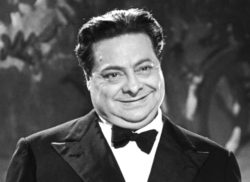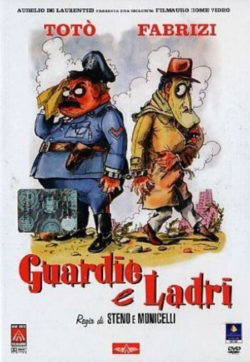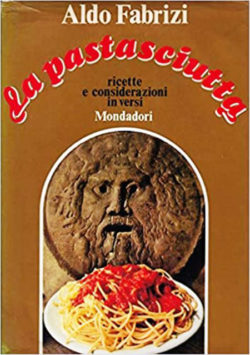Read Time: 3 Minutes Subscribe & Share
Taken From The World Too Al Dente – Aldo Fabrizi
 The Italian expression al dente describes perfectly cooked pasta texture. Not soggy and quadrupled in size, but toothy, with a bite.
The Italian expression al dente describes perfectly cooked pasta texture. Not soggy and quadrupled in size, but toothy, with a bite.
When the actor Aldo Fabrizi died in 1990, it was his wish that his epitaph be a line from a poem he penned, “Tolto da questo mondo troppo al dente”. That loosely translates to “taken from the world too al dente” or too undercooked. He was 85 when he was poured out of the boiling water of life.
Modern actors are not normally known for their love of food and eating, much less writing verse, which is what makes Fabrizi exceptionally unique in film history. Today remembered for his comic roles as a character actor, the Roman actor garnered international recognition for his dramatic performance as the fascist-fighting priest Don Pietro Pellegrini in Roberto Rossellini’s landmark movie Rome, Open City. If you haven’t seen it yet, put it on your summer watchlist and witness a World War II movie made a few days after Rome had been liberated by the Allies.
Roman Holiday
Aldo Fabrizi, Anna Magnani and Alberto Sordi were the holy acting trinity of postwar Rome, symbolizing the Eternal City’s transition from a life under a hardened economy with little room for social mobility to the capital of a booming first-world country.
Fabrizi was born into an Italy governed by a king, lived under a dictator and flourished as an actor in the republic that emerged after the war. The son of a carriage-driver and fruit and vegetable seller at Campo de’ Fiori, he was launched into the world of employment when he lost his father at the age of eleven. Many of his odd jobs and observations of working-class Rome inspired the character sketches and monologues that brought him notoriety as a stage actor in revues. The tram driver, waiter and doorman were all macchiette that he would take from theatre and bring to the screen or television. In fact he made his debut in 1942 as a tram ticket collector in Before the Postman, a movie he co-wrote with the director Mario Bonnard and a young Federico Fellini, whom Fabrizi trusted as a screenwriter and had him be part of the crew of Rome Open, City.
son of a carriage-driver and fruit and vegetable seller at Campo de’ Fiori, he was launched into the world of employment when he lost his father at the age of eleven. Many of his odd jobs and observations of working-class Rome inspired the character sketches and monologues that brought him notoriety as a stage actor in revues. The tram driver, waiter and doorman were all macchiette that he would take from theatre and bring to the screen or television. In fact he made his debut in 1942 as a tram ticket collector in Before the Postman, a movie he co-wrote with the director Mario Bonnard and a young Federico Fellini, whom Fabrizi trusted as a screenwriter and had him be part of the crew of Rome Open, City.
With his portly frame contrasting hysterically with his elegant movements and his face’s cartoon like expressions, Fabrizi was a distinctive and iconic screenstar. His career of eighty-five movies included titles that he both directed and wrote, like the The Passaguai Family and Immigrants, a period as a co-star with the Neapolitan comedian Totò, most notably in Cops and Robbers, and a vast number of comedies. Although not his final movie, Fabrizi’s last great performance was his role as a corrupt real-estate developer in Ettore Scola’s We All Loved Each Other So Much, playing an almost tragic version of his original comic Roman stock characters in a poignant story about the transition of three resistance fighters into the changing socio-economic landscape of Italy from the end of the war to the 1970s.
La pastasciutta and Nonna minestra
 But that poem, where did it come from? Fabrizi’s other two passions were writing poetry and enjoying food, and not merely as a consumer. His two books La pastasciutta and Nonna minestra whimsically combine culinary poems peppered with Roman dialect and his own recipes for popular, humble fare like pasta coi fagioli, pasta e ceci, soups and anything you can put hot chili peppers in. His sister, Elena Fabrizi, better known as Sora Lella, also shared the same enthusiasm for cooking and Roman cuisine. For decades, she was the woman behind the stove of her own eponymous restaurant, which is still in operation in Trastevere, although she passed away.
But that poem, where did it come from? Fabrizi’s other two passions were writing poetry and enjoying food, and not merely as a consumer. His two books La pastasciutta and Nonna minestra whimsically combine culinary poems peppered with Roman dialect and his own recipes for popular, humble fare like pasta coi fagioli, pasta e ceci, soups and anything you can put hot chili peppers in. His sister, Elena Fabrizi, better known as Sora Lella, also shared the same enthusiasm for cooking and Roman cuisine. For decades, she was the woman behind the stove of her own eponymous restaurant, which is still in operation in Trastevere, although she passed away.
In a television interview, Fabrizi revealed that the dish that really makes his heart sing is pasta all’amatriciana, a pillar of Laziale cuisine. There can be no doubt that pasta was his weakness, and he so eloquently and comically yields to temptation in this clip from Un militare e mezzo. Buona visione!

Juggling nuance between Italian and English, Tatiana lights up her five-burner kitchen top with nostalgia for American food, Bologna-inspired fare and cross-cultural inventions. She and her husband endlessly debate on cooking with or without a recipe. Their son just hopes that dinner will either be plain or have chocolate in it.




Comments are closed here.
Follow this link to create a Kitchen Detail account so that you can leave comments!